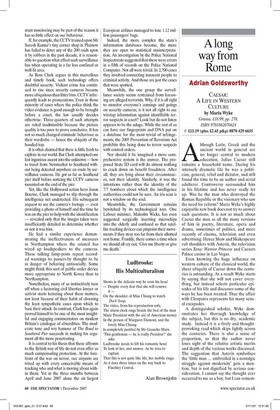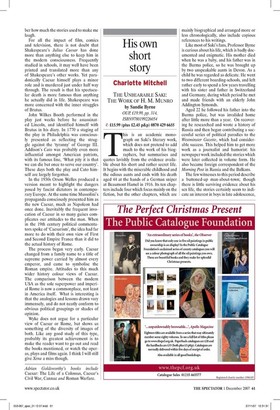A long way from Rome
Adrian Goldsworthy CAESAR: A LIFE IN WESTERN CULTURE by Maria Wyke Granta, £18.99, pp. 278, ISBN 9781862076624 £15.19 (plus £2.45 p&p) 0870 429 6655 Although Latin, Greek and the ancient world in general are no longer central to modern education, Julius Caesar still remains a household name. During his intensely dramatic life he was a politician, general, rebel and dictator, and still found the time to be an author and serial adulterer. Controversy surrounded him in his lifetime and has never really let up. Was he the man who destroyed the Roman Republic or the visionary who saw the need for reform? Maria Wyke's highly enjoyable new book does not try to answer such questions. It is not so much about Caesar the man as all the many versions of him in poetry, literature, opera and drama, sometimes of politics, and more recently of cinema, television and even advertising. Hence Shaw and Shakespeare rub shoulders with Asterix, the television series Xena: Warrior Princess and Caesars Palace casino in Las Vegas.
Even knowing the huge influence on western culture of the classical world, the sheer ubiquity of Caesar down the centuries is astounding. As a result Wyke starts by saying that she will not cover everything, but instead selects particular episodes of his life and discusses some of the ways he has been treated. Thus the affair with Cleopatra represents his many sexual escapades.
A distinguished scholar, Wyke demonstrates her thorough knowledge of the subject, but this is no dry, academic study. Instead it is a lively and thoughtprovoking read which skips lightly across the centuries. There is also a sense of proportion, so that the author never loses sight of the relative artistic merits and depth of the various works discussed. The suggestion that Asterix symbolises the 'little man ... embroiled in a nostalgic struggle against modernity' gets a mention, but is not dignified by serious consideration. I cannot say the thought ever occurred to me as a boy, but I can remember how much the stories used to make me laugh.
For all the impact of film, comics and television, there is not doubt that Shakespeare's Julius Caesar has done more than anything else to keep him in the modern consciousness. Frequently studied in schools, it may well have been printed and translated more than any of Shakespeare's other works. Yet paradoxically Caesar himself plays a minor role and is murdered just under half way through. The result is that his spectacular death is more famous than anything he actually did in life. Shakespeare was more concerned with the inner struggles of Brutus.
John Wilkes Booth performed in the play just weeks before he assassinated Lincoln, and identified himself with Brutus in his diary. In 1770 a staging of the play in Philadelphia was consciously presented as reflecting the struggle against the 'tyranny' of George III. Addison's Cato was probably even more influential amongst American patriots, with its famous line, 'What pity it is that we can die but once to serve our country'. These days both the play and Cato himself are largely forgotten.
In the 1930s Orson Welles produced a version meant to highlight the dangers posed by fascist dictators in contemporary Europe. At the same time Mussolini's propaganda consciously presented him as the new Caesar, much as Napoleon had once done. Inevitably the frequent invocation of Caesar in so many guises complicates our attitudes to the man. When in the 19th century political commentators spoke of `Caesarism', the idea had far more to do with their own view of First and Second Empire France than it did to the actual history of Rome.
The process began very early. Caesar changed from a family name to a title of supreme power carried by almost every emperor, and came to symbolise the Roman empire. Attitudes to this much wider history colour views of Caesar. The comparison between the modern USA as the sole superpower and imperial Rome is now a commonplace, not least in America itself. What is interesting is that the analogies and lessons drawn vary immensely, and do not neatly conform to obvious political groupings or shades of opinion.
Wyke does not argue for a particular view of Caesar or Rome, but shows us something of the diversity of images of both. Like any good study of this type, probably its greatest achievement is to make the reader want to go out and read the books mentioned, or watch the operas, plays and films again. I think I will still give Xena a miss though.
Adrian Goldsworthy's books include Caesar: The Life of a Colossus, Caesar's Civil War, Cannae and Roman Warfare.






































































 Previous page
Previous page